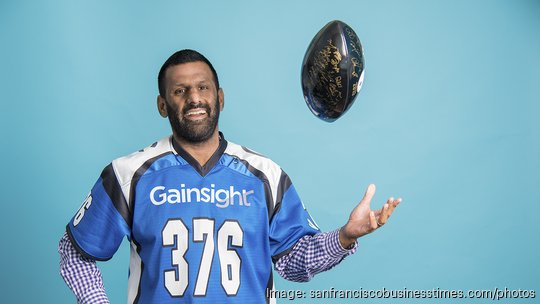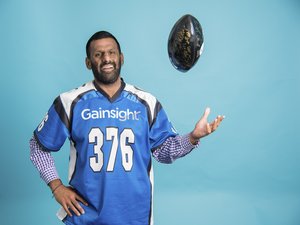
As the debate over remote work rages on and tech companies continue to slash jobs, a little-known software company in San Francisco jumped into Glassdoor's No. 1 spot on its annual Best Places to Work rankings earlier this month.
It's a moment that Gainsight has been working toward for years. In 2017, the company set an internal goal to become the top company on annual Glassdoor's list, which is based on employee reviews. Gainsight offered employees a remote-first workplace even before the pandemic, but it takes more than that to build a company's culture.
Want to tell the world how great your company is? Nominate it for the San Francisco Business Times and Silicon Valley Business Journal's Best Places to Work program. Click here.
Founded in 2009, the company develops customer service software and describes its mission as "being human first" — a tenet that longtime CEO Nick Mehta credits as underpinning the company's success among its own customers and its 1,300 employees.
I spoke with Mehta about how the company reached its Glassdoor goal and why he compares it to winning a Michelin Star.
How would you describe Gainsight’s mission? To be living proof you can win in business while being human first. The customer is a human being, prospective customers are human beings, your competitors are human beings, when a job candidate is applying to your job, they're a human being. When they're leaving your company, they're still a human being. In the business world, we naturally get desensitized to that. When people leave Gainsight, I email them and I'm like, “Congratulations, we really appreciate everything you've done. I'm happy for your next thing. Can we do a goodbye call so I can thank you?” I do a call with almost every employee that leaves Gainsight.
And what's kind of crazy is in 2017, when we wrote that [mission] statement, we said, OK, what's our goal that will show us that we've got there? Or we've achieved something? And it was to be No. 1 on Glassdoor. Literally. We wrote that down, and we all started laughing. Like, that's never gonna happen. I genuinely didn't think it was ever going to happen. And then it happened.
What do you think was the key to Gainsight jumping to Glassdoor’s top spot? It goes back to that purpose statement: human first. For some companies, the culture and the mission are more like a means to an end. They want to make money and they want to take their company public or whatever — and so, to do that, we're gonna have a great culture. For Gainsight, it was more like, no, the thing that's the most motivating to us is literally being a human first company. That's the reason we do it.
Then I think what ends up happening is habits reinforce that, because if it just stopped there, that's just a platitude, right? I send an email to the company every Sunday night about what's happening at Gainsight. It's called “Metaphysical Musings” because I have like a little fun with my name. And I talk about three things happening at Gainsight, then the book I'm reading, a show I just watched, what's happening with my family and pictures of my kids. None of that's earth shattering but it humanizes the CEO.
I send emails to every employee on their birthday and their anniversary at Gainsight. These things are so tactical, but when you add them all up, it all feels a little surprising. Most of the stuff comes from everyone else. I think one of the things, though, that probably catalyzed a lot of this was trying to embrace vulnerability, as well.
It seems like you try to treat your employees as good as, or maybe even better than, you treat your customers? We're selling to people who are basically managing customers, so what you just described — happy employees make happy customers — is one of the biggest truths or cliches out there. But you're right, most people don't do it. I don't even think it's necessary to treat them better, because it's just realizing they're all human beings.
What was your initial reaction when you heard the news? I was in Mexico for vacation and normally I try to totally disconnect. … This is the text I got from my Chief People Officer Carol [Mahoney], whose team deserves a huge chunk of the credit for this. They did an amazing job: “I really don't give a (bleep) that you're on vacation because I have amazing news. Check this.” … My response was, “Oh my god, oh my god. Oh my god. Oh my god.” I think I was literally jumping up and down.
What do you think sets Gainsight apart that led to the company jumping to No. 1? I respect the heck out of all those companies, and honestly, even if we're No. 100 on that list, that's crazy. And with all humility, Gainsight will also go up and down. They caught us at a good time because our business has done well. I texted not just our executives, but I texted a lot of our alumni. People that were there five, six years ago because I was like, the things you did then are why we are on this list now. It's not like we did something last month and now we're here. It's kind of like getting a Michelin star for your restaurant. You want to get it again next year but celebrate when you have it.
Gainsight is remote first and doesn't even have an HQ office space. Why was that the right decision to make for the company and your employees? When we launched in 2013, we had a few people in St. Louis, we had people in the Bay Area, and we had people in India. It's just how we got started. There are no direct flights between those places. And we were one of the first users of Zoom. We had an office in Mountain View and in St. Louis, but we were already distributed. At some point, we had more people working from home than were in any of these offices and those people told me, “I love Gainsight but it feels like it's very headquarter centric.” That kills me.
We started doing a lot of things to make it a level playing field. In the Bay Area, we said, OK, let's have two offices, one in the city and one in the Peninsula so you don't have to commute. That was another little baby step. And then with the pandemic, we were like, well, we're kind of ready for this. And you can't put the genie back in the bottle.
Are there other types of benefits that you started offering in the past few years since Covid? One thing we did — which we're definitely not the creator of nor are we the only one but I think it's a home run — is this thing we call “recharge days.” It's one day a month that is not a holiday and everyone's off. When you take vacation, the downside is everyone else is working and sending you emails, and you either check emails while you're on vacation or you know you're coming back to all these emails. This recharge day concept, people love it. And it's such a basic thing. One of the things people love about it is they're off on a random day. So they can actually get their errands done. They can get their car fixed. Go to the doctor. Things that you never get a chance to do.
So, kind of like a baked-in three day weekend every month? That's exactly what it is.
You started leading Gainsight when it was a relatively small startup, took it through a Series E and then a buyout. How have you managed maintaining the company's culture through that growth? We constantly got better at communication. I think that is a superpower of the company. We’re really good at communicating with employees. And I think that's one thing that happens to go away as you get bigger because people only know how to communicate if everyone's in an office. They don't know how to scale that up. Figuring out how to scale communications is something that's a really useful skill for any company as you grow. And that keeps the culture together.








